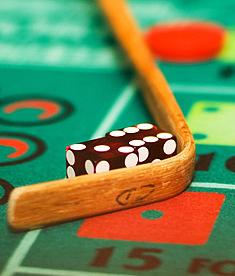Craps
MYTHS ABOUT THE ODDS IN CRAPS
(Section 2 - Overview)
Craps is no different than any other casino game in that it is very useful
to understand basic mathematics in order to play it.
 In doing any kind of research on the game, you will no doubt find various
writers who will advise you to seek out "hot shooters" at the table and bet
with them, but this has no real sound mathematical basis. Heck, ask any of
those shooters what it is that has made them hot and they would be stuck for
a plausible answer.
In doing any kind of research on the game, you will no doubt find various
writers who will advise you to seek out "hot shooters" at the table and bet
with them, but this has no real sound mathematical basis. Heck, ask any of
those shooters what it is that has made them hot and they would be stuck for
a plausible answer.
You'll also read a lot about the "law of averages." That's supposed to mean
that if an eight was rolled, then a five, then a ten, this chain of events
might somehow increase the possibility that a 7 will be rolled next, because
that number is somehow "due."
All of that sounds pretty good if you have nothing else to go on, but it
is simply not true.
If we are speaking purely along mathematical lines, just because a number
has been rolled, that doesn't decrease the odds of that number being rolled
again on the next turn.
When you hear that "The dice have no memory" that is certainly a true
statement.
As a mathematical exercise, craps follows something called the "law of
independent trials." This means that the occurrence of one event has absolutely
no bearing on the probability that any subsequent event will happen. The odds
are 5 to 1 that if someone picks up a pair of dice they're going to roll a 7,
and it's going to be 5 to 1 every time those dice are thrown, no matter how
many times a seven comes out. Nothing's going to make that any different, now
or in the future
If you took a jar where there were 50 pairs of numbers represented by
ping pong balls, and you removed one ball, and kept it out, that would reduce
(by 50%) the chances that another ball with the same number would be taken
out of the jar next. However, if you just put the ball back into the jar each
time, the odds would not change, simply because the composition of the contents
of that jar of ping pong balls would not change.
That really constitutes the difference between playing craps and playing
blackjack in the casino. You see, when cards are removed from the deck in
blackjack, they are placed in a discard rack (if you're lucky enough to play
in a game that is free of automatic shufflers) and removed from play. You can
bet that this has an effect one which cards can come up next. In fact, those
people who count cards at blackjack actually DO bet on it, because such activity
changes the odds dynamically each time a card is dealt. In craps, you are not
removing any possibilities from play, so the odds don't change. They are "static."
The odds on all the bets are the same, every time. When the automatic shuffler
is used in blackjack, it has roughly the same effect on the game.
For purposes of this conversation, this pertains to us because, for one thing,
it doesn't really matter where you enter the game; if you have learned anything
about craps you will know the odds on each of the bets. So if you're playing with
others it doesn't matter what anyone else is doing at the table.
Also, once the various bets and their payouts are learned, it actually simplifies
the game for the player who doesn't want to be concerned with learning strategies
for deriving an "edge" over the casino, because that edge isn't happening. Each
of the available craps wagers has a built-in advantage to the house; if you want
to only place bets in which you are giving up less than 2% to the house, you're
able to do that regardless of whatever else is happening
That won't change the long-term odds of the game, whether you want to believe
in the "law of averages" or not.
Breaking Down The Numbers
 In doing any kind of research on the game, you will no doubt find various
writers who will advise you to seek out "hot shooters" at the table and bet
with them, but this has no real sound mathematical basis. Heck, ask any of
those shooters what it is that has made them hot and they would be stuck for
a plausible answer.
In doing any kind of research on the game, you will no doubt find various
writers who will advise you to seek out "hot shooters" at the table and bet
with them, but this has no real sound mathematical basis. Heck, ask any of
those shooters what it is that has made them hot and they would be stuck for
a plausible answer.